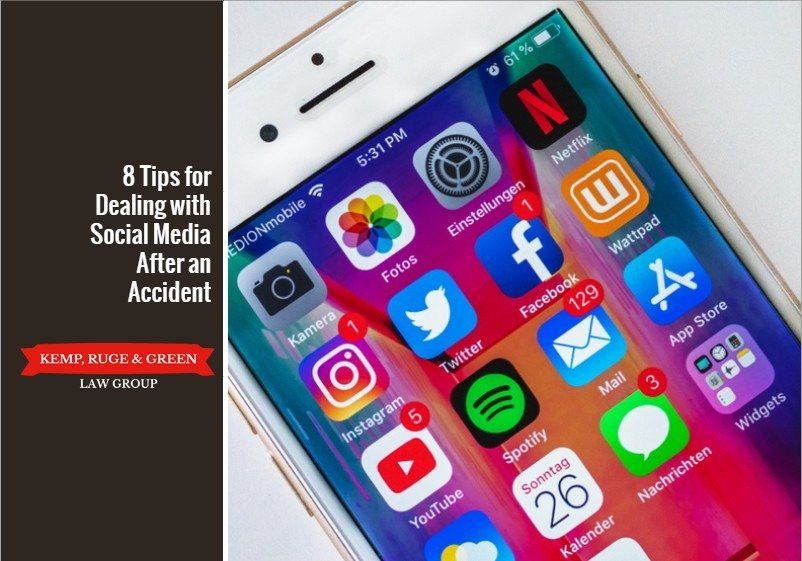

Social Media After an Accident:
Those who have been seriously injured in an accident that was caused by someone else’s negligence face devastating circumstances, from huge medical bills and many other damages. If the accident was someone else’s fault, the injured party shouldn’t have to pay for their injuries themselves and they shouldn’t be forced to suffer in silence. It should be the person responsible for the accident that should have to pays for the results of that accident.
That means an accident victim should hire an attorney as soon as possible to help you use the legal process to recover everything you’re entitled to. In order to prevail, however, you and your attorney will have to prove a number of elements. Even if you never see the inside of a courtroom, your attorney will also have to negotiate with insurance companies and opposing legal teams, who will be using every bit of information they can to get away with paying you as little as possible. That is why it is important to listen to your attorney when it comes to certain behavior after you file a lawsuit.
Be Careful What You Say or Do:
The first thing any personal injury attorney will tell you when you hire them is to be silent. You will be asked to not discuss anything about your accident or your case with anyone but your attorney. That includes members of your immediate family and friends. The reason for this is simple; the insurance company and opposing counsel will be looking for any information they can use to minimize their payout for your accident. Moreover, they have likely been doing so for years, which means they know what to look for. It is far too easy to say the wrong thing, even if you don’t intend to do so.
This universal advice is especially valuable when it comes to information in the current social media age. These days, people seem to post everything about their lives on sites like Facebook, Twitter, Instagram and YouTube. Sites like these can be valuable for keeping up with friends and family and reconnecting with people from your past, but they can also offer a veritable minefield of risk when you are in the middle of a lawsuit.
That is why every personal injury attorney instructs their clients to exercise a high degree of caution when it comes to activity on social media whenever they are involved in any litigation, including a personal injury lawsuit. It is far too easy to put up what you think is an innocent post and have someone from the other side misinterpret it or twist it to their benefit and work it against you.
For example, if your claim includes a back injury, but you post a photo on social media doing back flips, then those photos can be used against you by the insurance company. Insurance claims adjusters and attorneys on the defense team can easily use something as simple as a picture of you standing without assistance and smiling brightly to suggest that your injuries are less serious than you claim. Likewise, any photo that doesn’t show you in extreme pain, or any vacation photo from an exotic locale, can be twisted and potentially used against you. It doesn’t have to be photos; any language in any post that is inappropriate or can be twisted that way can potentially harm your case.
Tips for Posting on Social Media:
It is far too common for the victim of an accident to post something on social media that they believe is perfectly innocent, but which hurt their case and limited their options for a full recovery. That is why, before posting anything on social media, you should run it by your attorney first. In fact, if it is possible to avoid social media altogether while your case is pending, that would be best. However, if you can’t do that, follow these basic tips from the Personal Injury Attorneys at Kemp, Ruge & Green Law Group. They believe all injured accidents should follow before they post anything on social media, for their own protection:
- Set every social media account on “private.” Of course, even if you do that, be aware that “private” is not the same as “invisible.” Even your privacy settings are set at the highest level; it is still possible for others to gain access to some Facebook posts, Tweets, Instagram photos and other social media information. It is also likely that defense attorneys can and will seek a court order to get the information on your social media, even if you have it set to “private.”
- Never post anything without clearing it with your attorney first. You can’t know what you might regret later because you don’t know what may harm your case. Your attorney can read anything you plan to post with a highly trained eye and know how the opposing party and their counsel may take it and possibly use it against you.
- Never post anything when you’re upset. Likewise, never post anything based on your pain and suffering. As tempting as it is to vent about your circumstances, venting on social media can come back to haunt you and it can have a negative effect on your case.
- Never post anything about your physical condition. This is an important tip, not just for you, but also for your friends. Don’t post that you’re feeling better or that you’re feeling worse; you don’t even want to tell anyone who asks, “I’m fine,” no matter how innocuous that seems. Anything you say about your physical condition could become a problem if it doesn’t match exactly what the doctors say. When a friend asks how you’re feeling, don’t answer on Facebook or in a Tweet. Think about calling them or visiting, without putting any information on the public record.
- Never accept friends requests from strangers. Also, never allow anyone you don’t know in real life to connect with you on any social media, even Twitter. There are several reasons for this. First of all, you never know who is monitoring you or why. Also, the defense attorneys can call anyone into court to testify on what they saw or read and that can be used to you.
- Refrain from posting photos or videos of yourself. No matter how innocent they may seem. It is possible for those who see them misinterpret them, especially if they have a vested interest in doing so, like the insurance companies and opposing counsel.
- Don’t allow others to post anything about you. It is also important that you don’t allow others, including friends and family, to post anything about you, especially when they “tag” you. When someone tags you in a photo or other post, it is then possible to search for you and find the information you may not want people to know. If someone does that anyway, it’s easy to un-tag the photo or post and you should do so immediately and ask them to take down the post. Maintain this policy for the duration of the case.
- Don’t send texts or emails about your case to anyone. The only one with whom you should communicate electronically is your attorney and their law firm staff. Due to attorney-client privilege, communications with your attorney or anyone at the law firm can never be used against you. On the other hand, communications with anyone else can.
It is very important to always keep this in mind, insurance companies are in the business of collecting premiums and then paying out as little as possible on every claim, with zero dollars being the ultimate goal. They will actively investigate every detail and search for any information they can use to their advantage, to undermine your case. Those involved in any type of litigation, especially personal injury, should always be aware of the potential for damage to their case when they say anything to anyone. Virtually any social media posting can be detrimental to your case, so social media silence is your best bet. And don’t just limit your silence to social media. Anything you post anywhere online can be found if someone looks closely enough. And once the posting is out there, it can’t be taken back.
Put simply, if you have been injured in an accident of any kind, you should hire a knowledgeable and experienced personal injury attorney, like those at Kemp, Ruge & Green Law Group, to help you get the compensation you are entitled to; but when you do, understand that you will have to follow their lead, so they can do their best for you. That means a case-long radio silence on social media. Following the above tips will help you get the best settlement possible for your case.
-
April 19, 2024
Slip and Fall Cases in Riverview, Florida -
April 19, 2024
Court Trials for Car Accidents in Riverview, Florida -
April 18, 2024
Wrongful Death Cases in Riverview, Florida
Contact Us
About Your Case
We're ready to fight on your behalf. Request a free, no-risk consultation with our attorney's today.



